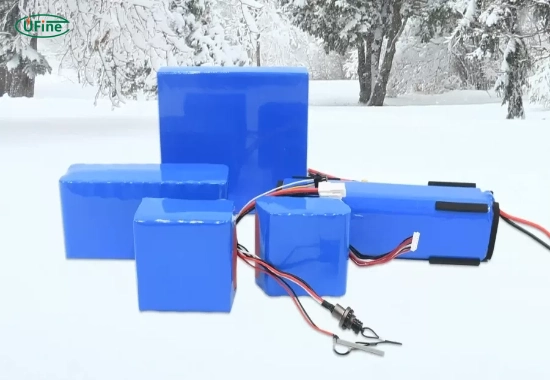Do lithium batteries freeze? This question is crucial for anyone who relies on lithium batteries for their devices, especially in colder climates. As temperatures drop, understanding how lithium batteries respond to cold weather can help users maintain optimal performance and extend the lifespan of their batteries. This article will explore the effects of cold weather on lithium batteries, how they function in low temperatures, and what best practices can mitigate any adverse effects.
Part 1. What are lithium batteries?
Lithium batteries are rechargeable energy storage devices that utilize lithium ions as the primary charge carriers. They have become increasingly popular due to their high energy density, lightweight design, and long cycle life. These batteries are commonly found in various applications, including smartphones, laptops, electric vehicles (EVs), and renewable energy systems.
Key characteristics of lithium batteries
- High Energy Density: Lithium batteries can store more energy in a smaller volume than other types of batteries, making them ideal for portable devices.
- Lightweight: Their lightweight nature allows for more accessible transport and integration into various devices without adding significant weight.
- Long Cycle Life: Lithium batteries typically have a longer lifespan than traditional lead-acid batteries, providing more charge cycles before experiencing significant degradation.
- Low Self-Discharge Rate: Unlike some other battery technologies, lithium batteries have a low self-discharge rate, meaning they retain their charge for more extended periods when not in use. This characteristic makes them suitable for emergency backup systems and devices that may sit idle for extended periods.
Part 2. How cold weather affects lithium batteries
Cold weather can profoundly impact the performance of lithium batteries. As temperatures drop, several changes within the battery can affect its efficiency and overall functionality.
Reduced Capacity
One of the most significant effects of cold weather is a temporary reduction in capacity. The chemical reactions that facilitate energy storage and release slow down considerably at low temperatures. This means that a lithium battery may hold less charge than at room temperature, leading to shorter usage times for devices powered by these batteries.
Increased Internal Resistance
Cold temperatures also lead to increased internal resistance within the battery. This resistance makes it more challenging for the battery to deliver power efficiently. As a result, users may notice sluggish performance during high-demand situations, such as when starting an electric vehicle or using power-intensive applications on their smartphones.
Risk of Freezing
While lithium batteries do not freeze in the traditional sense (like water turning to ice), they can experience severe performance degradation at very low temperatures. Typically, lithium-ion batteries operate effectively down to around -20°C (-4°F). Below this threshold, users may notice significant drops in performance and potential shutdowns of their devices.
Part 3. Can lithium batteries freeze?
The question remains: Can lithium batteries freeze? The answer is somewhat complex. While lithium batteries do not freeze like water, they can suffer from extreme cold conditions that severely impact their functionality.
What Happens at Freezing Temperatures?
When exposed to freezing temperatures:
- The electrolyte inside the battery can become more viscous, impeding the movement of lithium ions.
- Chemical reactions slow down significantly, leading to diminished capacity and power output.
- The battery may not be able to deliver power effectively or may shut down entirely until it warms up again.
Long-Term Effects of Cold Exposure
Prolonged exposure to freezing conditions can also damage lithium batteries in the long term. Over time, repeated freezing and thawing cycles may cause structural changes within the battery cells, potentially leading to issues such as swelling or leakage. This damage can significantly reduce the battery’s overall lifespan and performance.
Part 4. Signs of cold weather impact on lithium batteries
Users should be vigilant for several signs indicating that their lithium battery is struggling due to cold weather:
- Decreased Runtime: If your device runs out of power much quicker than usual when exposed to cold conditions, it may indicate that the battery is affected by low temperatures.
- Slow Charging: Charging may take longer than expected as the battery struggles to accept energy efficiently due to increased internal resistance.
- Device Shutdowns: In extreme cold conditions, devices powered by lithium batteries may shut down unexpectedly to protect themselves against potential damage.
Part 5. Best practices for using lithium batteries in cold weather
To ensure optimal performance of lithium batteries during cold weather, consider implementing these best practices:
- Keep Batteries Warm: Store and use your devices in warmer environments whenever possible. For example, keeping your phone close to your body can help maintain its temperature.
- Use Battery Heaters: Battery heaters are specialized devices that warm lithium batteries in extreme cold conditions. These heaters can help maintain optimal operating temperatures and prevent performance degradation.
- Avoid Full Discharge: Do not let your battery discharge completely before recharging; this practice helps preserve its overall health and longevity.
- Use Insulation: For larger batteries in electric vehicles or RVs, consider using thermal insulation or heating pads designed specifically for battery protection against cold weather effects.
- Monitor Battery Health Regularly: Keeping an eye on your battery’s health through monitoring apps or built-in diagnostics can help you identify any issues early on. Regular checks allow you to act before minor problems escalate into major failures.
Part 6. FAQs
-
What is the lowest temperature a lithium battery can operate at?
Lithium batteries generally operate effectively at around -20°C (-4°F). Below this temperature, performance may degrade significantly. -
Can I charge my lithium battery in cold weather?
Charging a lithium battery in icy conditions is not recommended, as it can increase internal resistance and cause potential damage. It’s best to warm up the battery before charging. -
How long can a lithium battery recover from cold exposure?
Recovery time varies depending on the extent of exposure and ambient temperature. Still, once warmed up, a battery generally takes several minutes to hours to return to normal operating conditions. -
Will my electric vehicle’s range decrease in winter?
Yes, electric vehicles with lithium batteries often experience reduced range in colder weather due to decreased capacity and increased resistance during operation. -
Are there any long-term effects of using lithium batteries in cold weather?
Repeated exposure to extreme cold can lead to permanent capacity loss and reduced lifespan if proper precautions are not taken. Structural damage from freezing cycles can further compromise battery integrity over time.
Related Tags:
More Articles

How to Choose the Best Floor Scrubber Battery for Commercial Cleaning?
Selecting the ideal floor scrubber battery ensures a long runtime, rapid charging, and minimal maintenance for efficient commercial cleaning operations.
Battery for Blower vs Battery for Leaf Vacuum: Which One Should You Choose?
Battery for blower vs leaf vacuum—learn the key differences in power, fit, and runtime to choose the right battery for your outdoor tool needs.
How to Choose the Right Battery for Blower?
Choosing the right blower battery? Consider voltage, capacity, chemistry & usage. This guide helps match the best battery for peak performance.
How to Choose the Best Insulated Battery Box for Lithium Batteries?
Choosing the Best Insulated Battery Box for Lithium Batteries? Discover key factors such as size, material, and safety for optimal protection and performance.
7 Critical Elements on a Lithium Battery Shipping Label
What must be on a lithium battery shipping label? Learn 7 key elements to ensure safety, legal compliance, and correct handling across all transport modes.





